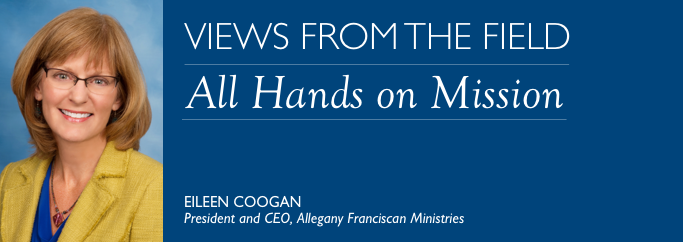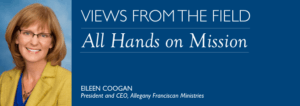
Allegany Franciscan Ministries is a mission-driven grantmaker whose staff, board, and community volunteers strive to understand and connect with the realities faced by the marginalized communities served by the organization. After the November elections, although Allegany had not yet seriously considered the dramatic changes that would now significantly impact its grant partners and the vulnerable people they serve, its culture of connection was primed to create a space open to understanding and decisionmaking, based on its mission and values.
Background
Allegany Franciscan Ministries is a nonprofit Catholic organization that seeks to improve the overall health status of underserved marginalized individuals. A member of Trinity Health, Allegany provides grants, invests in organizations and communities, and works collaboratively with others to improve health primarily in three regions of Florida. Current grant-funded projects align with Allegany’s focus by eliminating barriers to health, advocating for health reform, or providing health navigation and care coordination. In 2014, Allegany launched a focused, community-driven approach to create healthier communities, to complement its traditional grantmaking. It increased the number of its general operating support grants, and made multiyear grants, before many of its peers.
Following the passage of the Affordable Care Act (ACA), Allegany supported statewide and local navigation, education, outreach, and enrollment efforts. It encouraged organizations to apply for grants to support enrollment activities and funded several efforts to close the coverage gap in the state.
Throughout 2016, Allegany continued “business as usual,” conducting traditional grantmaking and working in its place-based initiative to address community-defined priorities. Allegany re-committed to working for Medicaid expansion in Florida and prepared to continue supporting enrollment efforts, which by 2016 had decreased the uninsured rate for 18 to 64-year-olds to 13.2 percent, from 21.5 percent in 2013, according to Enroll America.
The results of the 2016 presidential and state elections surprised Allegany’s team. As an organization always driven by its mission and values; Allegany used them as a guide to its response.
One of Allegany’s cornerstone partners in increasing access to health care for all is Florida CHAIN, a statewide health advocacy group with an important role in ACA implementation, collecting consumer stories, aligning groups across the state, and working for expansion. CHAIN has a two-year, $120,000 grant from Allegany.
After the election, CHAIN’s other major funder announced that it would redirect its funds to invest in federal level health access efforts. As a result, CHAIN immediately made plans to lay off all five of its staff. Although CHAIN was prepared to return Allegany funding in the amount of $60,000, Allegany allowed CHAIN to keep the funds while working together to help maintain and sustain the organization.
Many of Allegany’s other past and present grant partners are expressing fear, uncertainty, and anxiety, and share that the vulnerable people they serve are also afraid. At the same time, a chorus of “now more than ever” comes through – a commitment to continue and to persevere to protect and help those who are most vulnerable.
In the wake of the elections, Allegany is learning as much as possible, looking for common themes, discerning what actions it might take now, and where it might make changes over the next year. It is looking beyond its traditional information resources, gathering information from its “go-to” philanthropic sources such as Grantmakers In Health, as well as local, state, and national resources such as Holland & Knight and The Advisory Board.
Specifically, Allegany is:
- “Digging in” to its mission, recognizing that now more than ever its mission—to serve together in the spirit of the Gospel to be a compassionate and transforming healing presence within communities—is critical.
- Using its values to drive decision making and to combat hopelessness. Even in a state like Florida, giving up on access for all is not an option.
- Asking grant partners to share what they know or think, and what they need.
- Adding questions to grantee letters of intent about the perceived impact of the election and how the organization is responding.
- Meeting with current grant partners to listen, understand, and adjust.
- Meeting with community members and stakeholders in the “Common Good Communities” to understand how those communities are impacted.
- Creating space and time on the agenda at its December board meeting to share what has been learned and to engage in a dialogue about what can be done. Creating similar space at grants committee and local community meetings.
Margaret Mary Kimmins, one of the Sisters on Allegany’s board of directors, often quotes an old adage, with a twist. Most people have heard “Give people fish and you feed them for a day. Teach people to fish and they will be fed for a lifetime.” Sister Margaret Mary asks, “What happens when there is a fence around the pond?” Until talk of a wall between the United States and Mexico began, this question wasn’t meant literally. Rather, it has served as a guide to Allegany Franciscan Ministries to identify the barriers that oppress or marginalize people. Many of these “fences” are deeply rooted social and economic systems, others are policies and procedures designed to keep certain people out.
Grantmakers, with their individual and collective might, have a responsibility to use their resources for good. Grantmakers should always be true to themselves – honoring their history, mission, and values in decisionmaking. The suggestions below should be interpreted in this light.
What Grantmakers Can Do Right Now
- Keep breathing. Don’t give up.
- Recognize and honor feelings, while avoiding knee-jerk fear-based reactions. Be educated. Get the facts or educated projections. Broaden the source of information – get out of philanthropic and nonprofit silos.
- Be patient, understand that you do not have all the answers. Be prepared to act swiftly when you do have enough answers.
- Listen. Ask partners what they are experiencing. Let them know you will work with them.
- If you have been considering a simplified application or reporting process, or other changes to lighten the burden on grant partners, implement these changes now!
- Remember that there are few rules for funders – for the most part, funding focus, policies, and procedures are up to the grantmaker, and can be changed. If it is a rule or policy that you made up for your grantmaking organization, you can change it! Exercise this freedom.
What Grantmakers Can Do Moving Forward
- Use your voice, backed by your dollars, and in concert with other grantmakers, to share your perspective with policy makers.
- Support collaboration – directly convene people and groups, and fund those who are joining forces.
- Support community organizing starting at a grassroots level. Use resources to empower communities to find and broadcast their voice.
- Participate in long-term planning and convening with others, designed to reverse the increased polarization of views and build understanding.
- Look at what you are funding and whether new investments might be helpful.
- Consider emerging (or re-emerging) needs.
- Keep breathing. Don’t give up.

